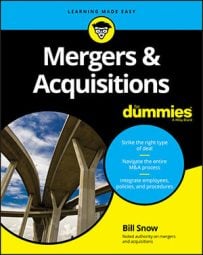In addition to the common advisors like lawyers and accountants, Buyers in M&A deals may need to enlist the services of additional outside advisors including environmental consultants, database/IT consultants, and marketing consultants. However, these consultants are farther down the food chain and aren’t part of every deal.
M&A technology consultants
If the acquired company utilizes technology (such as the contents of a customer information database or some proprietary software designed and built by Seller) as any component of what Buyer is buying, Buyer should strongly consider hiring an appropriate consultant to test and confirm the strength of the technology.
Testing the technology is important because many (if not all) of the decision-makers aren’t computer programming experts. Bringing in an outside expert to test the software may be the only way to determine whether the software truly is as strong as Seller claims.
M&A marketing consultants
Getting a marketing consultant’s third-party opinion on a company’s marketing strategy may make sense for Buyer as a way to determine where it can make improvements in marketing post-acquisition. However, using this report to argue for a price reduction is a dubious practice Buyers should avoid.
M&A environmental consultants
Buyers should hire an environmental consultant especially if they’re acquiring land and/or have reason to suspect the site of the business may be on contaminated land.
Responsibility for contaminated land is a hot-button issue as of late. The Environmental Protection Agency (EPA) can make Buyer’s life miserable if it discovers after a transaction closes that land acquired as part of the deal has an environmental problem.
Some key questions the Buyer’s consultant should ask include
What was the land used for prior the being home to Seller’s business? Specifically, was it a gas station, a recycling facility, or a manufacturing facility?
Were heavy metals previously fabricated on these premises?
The due diligence pertaining to land comes in two types of phases:
Phase I: A Phase I is basically a review of records from local, state, and any pertinent regulatory agencies, focusing on the current use and past use of the real estate in question. The review includes photos, maps, and an examination of aerial pictures, as well any information pertaining to the local water table.
A Phase I usually includes a walk-through of the premises and lands. The examiner is looking for tanks (oil, gas, chemical, and so on) and other visual evidence of some sort of problem or issue.
Phase II: If, based on the findings in the Phase I review, the examiner believes the property may have issues, a Phase II may occur. A Phase II is a more in-depth, on-premise review and analysis. Some of the problems the Phase II tries to uncover include nasty things such as radon, asbestos, and other hazardous materials.
Buyer may include an environmental assessment as part of due diligence, but it may make sense for Seller to go ahead and conduct a Phase I prior to the M&A process. If the Phase I is clean and relatively recent, Buyer may be able to skip further environmental testing, thus saving time.
Depending on the consultant’s findings, Buyer may be in a position to demand strong representations and warranties as part of the deal if the land presents an environmental problem. Speak to your attorney for more advice.

